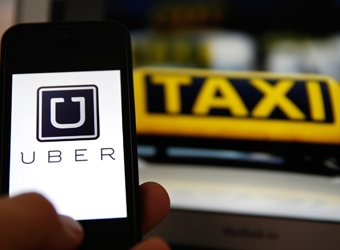Uber found itself at the centre of a storm created by the travel ban imposed by U.S. President Donald Trump’s executive order, as angry customers accused the company of attempting to profit from a taxi driver work stoppage.
In response to a growing controversy, Uber announced it would create a $3 million defense fund to help cover the legal expenses associated with the executive order. It was unclear, however, if the move would be sufficient to quell the firestorm surrounding one of Silicon Valley’s darlings and a fixture in countless mobile devices.
On Saturday, The New York City Taxi Workers Alliance called for a temporary halt to rides heading to John F. Kennedy airport. Several immigrant detainees were being held at a terminal there before being released when a judge intervened to block parts of Trump’s executive order. The alliance, which is not a union but a cab driver advocacy group, sought to rally drivers in support.
Uber continued to carry passengers—many of them protesters rallying in support of detainees—to the airport. However, the company announced shortly after 730pm Eastern that it would temporarily suspend surge pricing, in recognition that demand would be unusually high.
Still, users—angered by the fact that the company didn’t completely halt service in solidarity—lashed out by vowing to delete their Uber applications. Some pledged to switch to competitor Lyft, even though Uber CEO Travis Kalanick was one of the first Silicon Valley chiefs to come out against the Trump travel ban.
Uber pledged its support to drivers affected by what it called Trump’s “unjust” ban, even promising to compensate them for lost wages.
That, however, failed to placate a client base riled up by the travel ban. Some pointed out that Kalanick was a member of the president’s advisory council on business. In a statement, Kalanick said he would use his leverage with Trump to address the travel ban.
Yet on Sunday afternoon, the backlash appeared to widen. Twitter lit up with celebrities expressing their outrage and planning to delete the app.
Boldface names such as Lena Dunham, George Takei, Taraji P. Henson and Janelle Monae all suggested they would join the Uber boycott.
A spokesperson contacted by CNBC said Uber was “sorry for any confusion about our earlier tweet—it was not meant to break up any strike. We wanted people to know they could use Uber to get to and from JFK at normal prices, especially last night.”
Separately, Lyft said it would donate $1 million to the ACLU, which spearheaded the legal action that resulted in the freeing of detainees.
Source: CNBC
